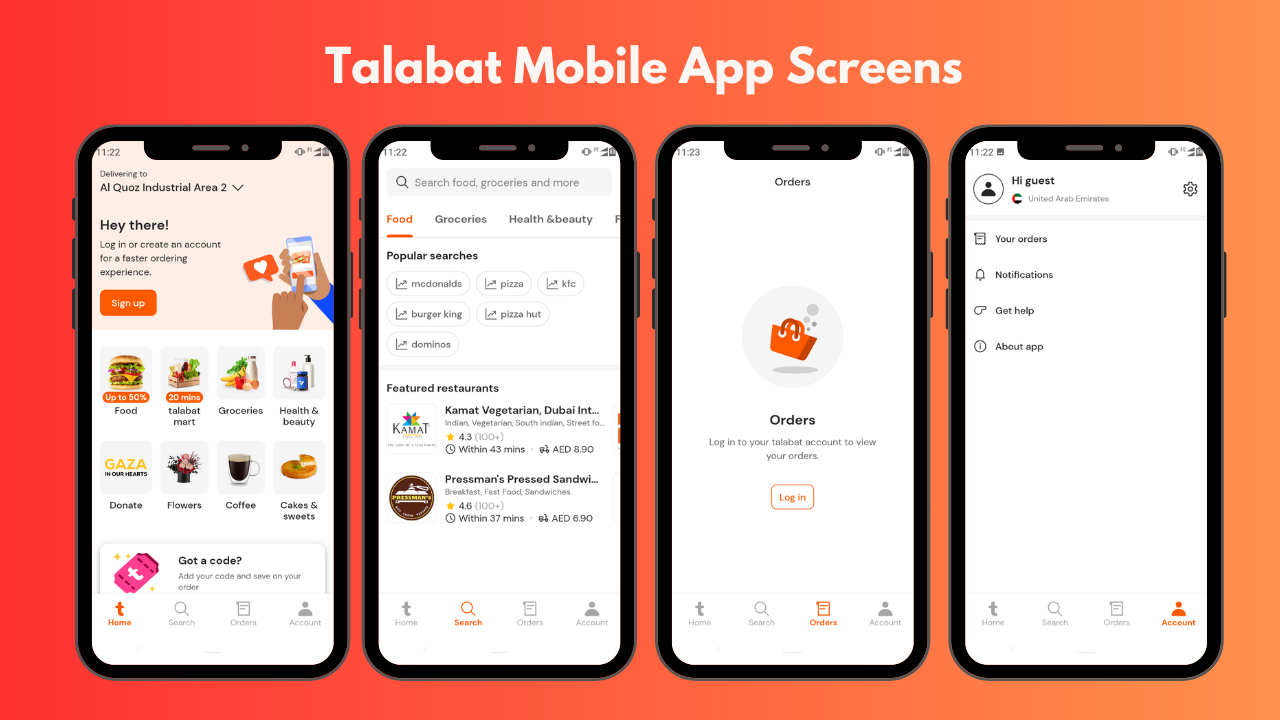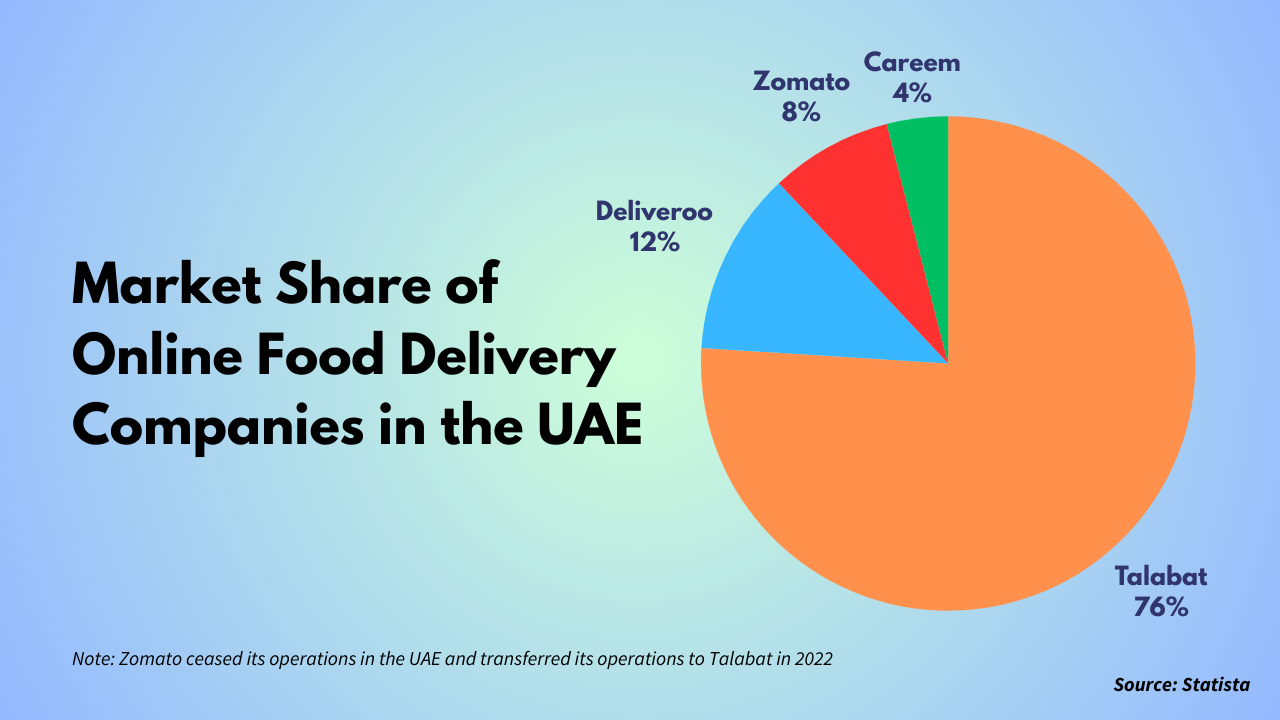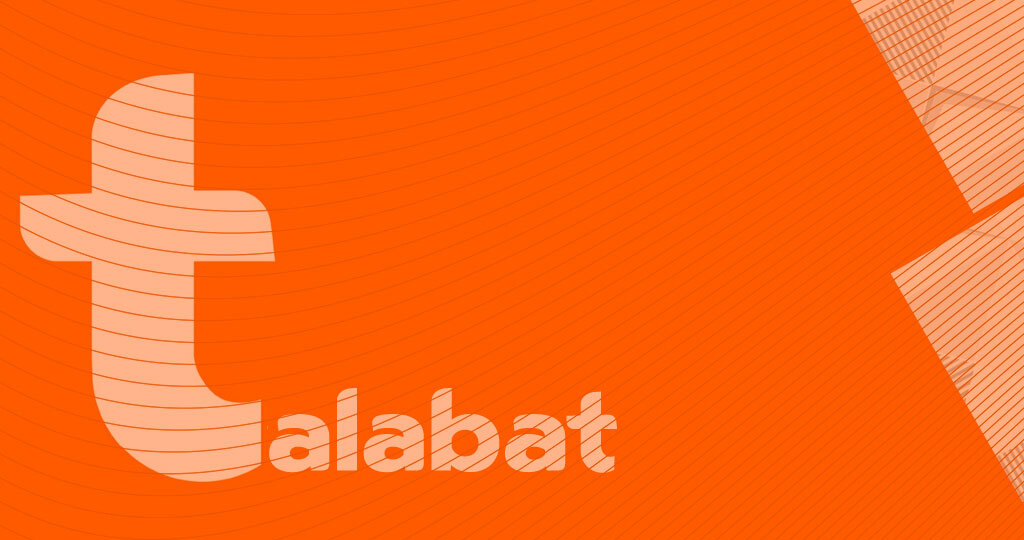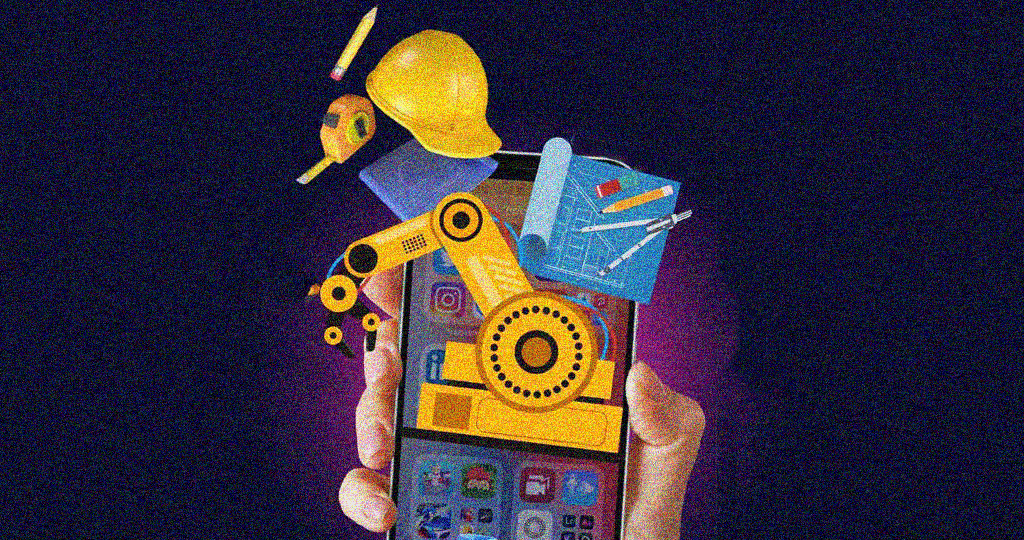When friends and family in the UAE get together, don’t have the time to cook and want to order food online, the first thing that comes to their mind is Talabat!
Talabat, one of the best online food delivery apps in Dubai, has made its place into people’s hearts since its inception in 2012 in the UAE.
The company was originally founded in 2004 in Kuwait, 24 years later, it has made its position concrete as the best food delivery app not only in the UAE, but also in the MENA region. In this blog, we will uncover how the company was started, what goes behind the scenes in their operations and also get into the most interesting subject of how to build a successful app like Talabat.
Key Takeaways
Talabat operates in 9 countries across the Middle East and North Africa region, including Kuwait, Saudi Arabia, Bahrain, UAE, Oman, Qatar, Jordan, Egypt, and Iraq.
The success of Talabat is largely due to its user-friendly mobile app, which offers easy navigation, real-time order tracking, and personalized recommendations.
Continuous investment in technology and innovation, including AI and data analytics, has been crucial for Talabat's market dominance.
Developing a clone app like Talabat is a cost-effective way for new businesses to enter the market quickly, leveraging proven models and user experiences.
Story of Talabat
Talabat was founded in 2004 in Kuwait, by a group of entrepreneurs, who had a vision to deliver food through the internet to their customer base. Talabat(طلبات) actually means “orders” in Arabic.
It was very difficult for the company to carry out the operations, as the internet did not work the way it is used today. And back then there was no Google Maps either! But going through all of the hindrances, Talabat emerged successful, winning several awards and accolades. And in the consequent years, Talabat expanded its operations to several countries in the Middle East and North Africa. Talabat currently operates in 9 countries across the Middle East and North Africa region, including Kuwait, Saudi Arabia, Bahrain, UAE, Oman, Qatar, Jordan, Egypt, and Iraq.
Talabat’s Mobile App
The real reason behind the continued success of the company is how easy and accessible they made their mobile app. Talabat’s mobile app is available in both App and Play stores, therefore, attracting customers from both mobile platforms, iOS and Android respectively. Let’s take a closer look at the screens of Talabat’s mobile app:

Home Screen: The Home Screen of the Talabat app serves as the main hub for users to navigate through various categories and services offered. This screen is designed to provide easy access to different sections such as Food, Talabat Mart, Groceries, Health and Beauty, Donate to Gaza, Flowers, Coffee and Cakes.
Search Screen: The Search Screen allows users to search for specific restaurants, cuisines, or dishes. This screen also features recommended restaurants based on the user's preferences, location, and popular choices, making it easier for users to choose their restaurant.
Orders Screen: The Orders Screen provides a detailed history of the user's past orders. Users can review their previous orders, reorder their favorite meals, and see the status of ongoing deliveries. This screen helps users keep track of their food ordering habits and manage their future orders more efficiently.
Account Screen: The Account Screen is where users can manage their personal details and app settings. This screen includes options for Account Details, Settings and getting help.
Menu Screen: The Menu Screen displays the detailed menu of a selected restaurant. Users can browse through different food categories, view item descriptions, prices, and customize their orders with specific preferences or add-ons.
Checkout Screen: The Checkout Screen is where users finalize their orders. This screen includes, order summary, delivery details, payment options and offers and promotions
Order Screen: The Order Screen provides real-time updates on the status of the user's order. Users can track their order from the moment it's placed until it arrives at their doorstep. This screen shows the preparation time, estimated delivery time, and the delivery driver's location, helping users to stay informed about their order's progress.
Design and UX Strategies Employed by Talabat
We saw how easily accessible the mobile app screens were. In order to achieve this, Talabat employs several design and UX strategies to provide a seamless and enjoyable experience for its mobile app users. Here are some key strategies they use in their mobile app:
User-Centric Design: The mobile app features a simple and intuitive navigation system, making it easy for the users to find the restaurants and the services they are looking for without any confusion. The app also offers several personalized recommendations based on user preferences, past orders, and location, enhancing the relevance of suggestions.
Clean and Organized Interface: The home screen is divided into clear sections like Food, Talabat Mart, Groceries and more which allows users to quickly find the category they are interested in. The app also has a clean, minimalistic design with ample white space, making it visually appealing and reducing cognitive load.
Efficient Search Functionality: The search feature in the app is designed to be very fast and efficient, offering autocomplete suggestions and displaying relevant results as soon as users type. Recommended restaurants are displayed immediately, helping users discover popular and highly-rated options easily.
Seamless Order Process: The orders screen provides easy access to past orders, enabling users to quickly reorder their favorite meals. The checkout process is also made easy, with a clear summary of the order, multiple payment options, and the ability to apply offers and promotions.
Real-Time Order Tracking: The order screen provides real-time updates on the status of the order, including preparation, pickup, and delivery tracking. Users can see the estimated delivery time and track the delivery driver’s location on a map.
Enhanced User Support: The account screen includes easy access to customer support, with FAQs, live chat, and contact information readily available. Users can customize app settings, such as notifications and language preferences, to suit their needs.
Engaging Visuals and Branding: The app uses high-quality images for food items and promotional banners, making the browsing experience more engaging and appetizing. The design maintains consistent branding throughout the app, providing a cohesive look and feel.
Accessibility and Inclusivity: Talabat has designed its app with accessibility in mind, ensuring that it is usable by people with various disabilities. Support for multiple languages makes the app accessible to a broader audience in the MENA region.
Performance Optimization: The app is optimized for quick loading times, reducing wait times and enhancing the overall user experience. Regular updates and maintenance ensure that the app runs smoothly and reliably.
How Talabat Dominates the UAE's Online Food Delivery Market?
Talabat holds a whopping 76% share in the UAE’s online food delivery market. One of Talabat’s primary advantages in becoming the industry leader was its early entry, positioning itself ahead of its time in the online food delivery market. This early move enabled the company to establish strong foundations.
As competitors entered the UAE’s online food delivery market, Talabat implemented effective advertising strategies that not only helped retain its customer base but also facilitated its expansion. During the COVID-19 pandemic, Talabat emerged as a leader in implementing safety measures within the food and beverages industry.

But, above all these advantages, Talabat’s immense investment in technology and innovation is what always had kept the company far from beatable. The company has continuously improved its mobile app, ensuring that the user experience was on point.
The company also integrated AI and data analytics into its operations which helped Talabat to offer personalized suggestions, optimize delivery routes, reduce wait time and much more. Talabat's refusal to compromise on user experience and its continuous eagerness to offer new features to its customer base are the main factors that contribute to its dominance in the UAE's online food delivery market. Looking forward, these advancements hint at the promising future of delivery businesses in Dubai, where technology-driven enhancements will likely play a crucial role in shaping customer expectations and operational efficiencies across the industry.
How Much Does It Cost to Build an App Like Talabat?
Developing an app like Talabat needs significant investment due to its numerous features and operational scale. The development costs can typically range between $50,000 to $250,000, depending on the complexity and scope of functionalities required for your own food delivery app. This includes expenses for hiring a skilled mobile app development team, designing a user-friendly interface, integrating secure payment gateways and implementing backend infrastructure to support smooth operations.
Moreover, ongoing expenses for maintenance, updates, and server costs must be considered to ensure the app's reliability and scalability. Factors such as market research, competitor analysis and compliance with regulatory standards also influence development costs.
Costs and Benefits of Clone App Development: The Talabat Model
Developing a clone app for online food delivery, such as a Talabat clone, is an excellent budget-friendly option for entrepreneurs looking to enter the UAE food delivery market quickly. Clone app development makes use of the existing, successful app models, significantly reducing the time and cost associated with developing an app from scratch. This allows businesses to focus on customization and unique features to differentiate their service from other businesses while keeping development expenses manageable.
According to a recent report, the global market for clone app development is projected to grow at a CAGR of 16.5% from 2021 to 2026, highlighting its increasing popularity as a cost-effective solution for entering competitive markets.
Additionally, clone apps benefit from a proven user experience and functionality, increasing the chances of market acceptance.
However, it is very important to consider the legalities involved in clone app development carefully. Making sure that the cloned app does not infringe on copyrights, trademarks, or patents is essential. Entrepreneurs should seek legal counsel to draft appropriate terms of service and privacy policies and ensure compliance with local and international regulations.
Conclusion
Talabat's success story is a prime example of how a company can leverage innovation and customer focus to dominate a very competitive market in a country like the UAE. With its user-friendly mobile app and its huge investment in latest and innovative technologies, Talabat has consistently strived to provide an exceptional user experience to its customers. As a result, it has become an essential part of everyday life for millions in the UAE.
If you are an entrepreneur looking to enter the UAE's online food delivery market, consider partnering with Way2Smile Solutions, a leading mobile app development company in Dubai. We specialize in clone app development solutions, allowing you to leverage the success of existing models like Talabat while integrating your unique features and branding. Our team of experienced mobile app developers can help you create a cost-effective and user-friendly app that will take your business to the next level.
Contact us today to develop your own online food delivery app in the UAE.







